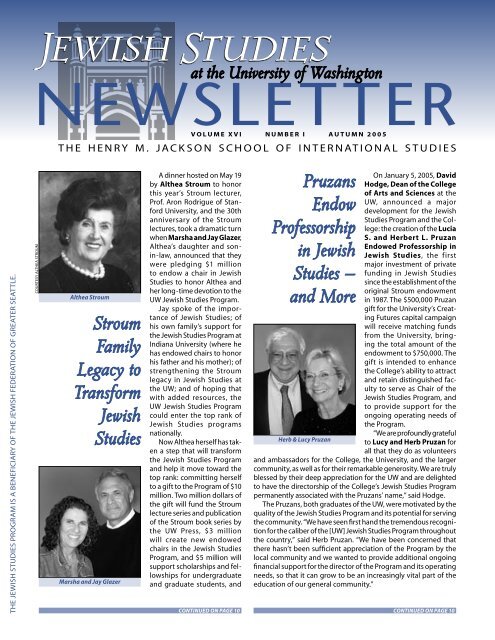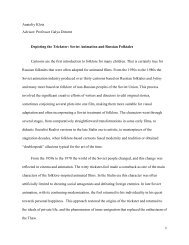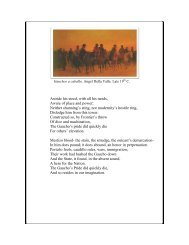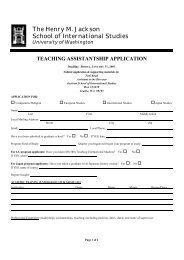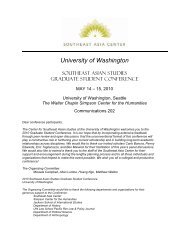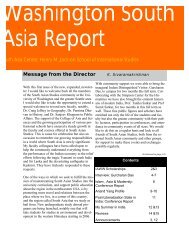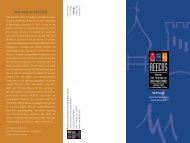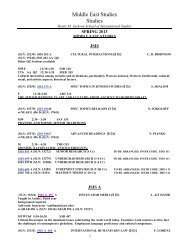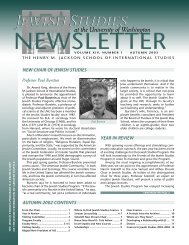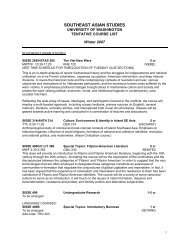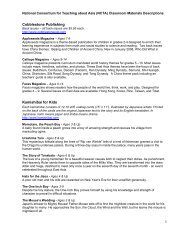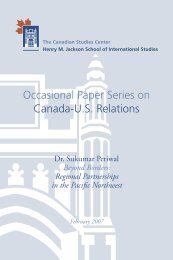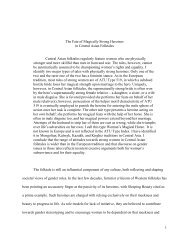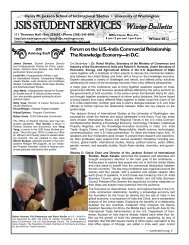js nl 05 9-25 final run! copy - Jackson School of International Studies ...
js nl 05 9-25 final run! copy - Jackson School of International Studies ...
js nl 05 9-25 final run! copy - Jackson School of International Studies ...
Create successful ePaper yourself
Turn your PDF publications into a flip-book with our unique Google optimized e-Paper software.
THE JEWISH STUDIES PROGRAM IS A BENEFICIARY OF THE JEWISH FEDERATION OF GREATER SEATTLE.<br />
JEWISH STUDIES<br />
at the University <strong>of</strong> Washington<br />
NEWSLETTER<br />
V O L U M E X V I N U M B E R I A U T U M N 2 0 0 5<br />
COURTESY ALTHEA STROUM<br />
T H E H E N R Y M . J A C K S O N S C H O O L O F I N T E R N AT I O N A L S T U D I E S<br />
Althea Stroum<br />
Stroum<br />
Family<br />
Legacy to<br />
Transform<br />
Jewish<br />
<strong>Studies</strong><br />
Marsha and Jay Glazer<br />
A dinner hosted on May 19<br />
by Althea Stroum to honor<br />
this year’s Stroum lecturer,<br />
Pr<strong>of</strong>. Aron Rodrigue <strong>of</strong> Stanford<br />
University, and the 30th<br />
anniversary <strong>of</strong> the Stroum<br />
lectures, took a dramatic turn<br />
when Marsha and Jay Glazer,<br />
Althea’s daughter and sonin-law,<br />
announced that they<br />
were pledging $1 million<br />
to endow a chair in Jewish<br />
<strong>Studies</strong> to honor Althea and<br />
her long-time devotion to the<br />
UW Jewish <strong>Studies</strong> Program.<br />
Jay spoke <strong>of</strong> the importance<br />
<strong>of</strong> Jewish <strong>Studies</strong>; <strong>of</strong><br />
his own family’s support for<br />
the Jewish <strong>Studies</strong> Program at<br />
Indiana University (where he<br />
has endowed chairs to honor<br />
his father and his mother); <strong>of</strong><br />
strengthening the Stroum<br />
legacy in Jewish <strong>Studies</strong> at<br />
the UW; and <strong>of</strong> hoping that<br />
with added resources, the<br />
UW Jewish <strong>Studies</strong> Program<br />
could enter the top rank <strong>of</strong><br />
Jewish <strong>Studies</strong> programs<br />
nationally.<br />
Now Althea herself has taken<br />
a step that will transform<br />
the Jewish <strong>Studies</strong> Program<br />
and help it move toward the<br />
top rank: committing herself<br />
to a gift to the Program <strong>of</strong> $10<br />
million. Two million dollars <strong>of</strong><br />
the gift will fund the Stroum<br />
lecture series and publication<br />
<strong>of</strong> the Stroum book series by<br />
the UW Press, $3 million<br />
will create new endowed<br />
chairs in the Jewish <strong>Studies</strong><br />
Program, and $5 million will<br />
support scholarships and fellowships<br />
for undergraduate<br />
and graduate students, and<br />
Pruzans<br />
Endow<br />
Pr<strong>of</strong>essorship<br />
in Jewish<br />
<strong>Studies</strong> —<br />
and More<br />
Herb & Lucy Pruzan<br />
On January 5, 20<strong>05</strong>, David<br />
Hodge, Dean <strong>of</strong> the College<br />
<strong>of</strong> Arts and Sciences at the<br />
UW, announced a major<br />
development for the Jewish<br />
<strong>Studies</strong> Program and the College:<br />
the creation <strong>of</strong> the Lucia<br />
S. and Herbert L. Pruzan<br />
Endowed Pr<strong>of</strong>essorship in<br />
Jewish <strong>Studies</strong>, the first<br />
major investment <strong>of</strong> private<br />
funding in Jewish <strong>Studies</strong><br />
since the establishment <strong>of</strong> the<br />
original Stroum endowment<br />
in 1987. The $500,000 Pruzan<br />
gift for the University’s Creating<br />
Futures capital campaign<br />
will receive matching funds<br />
from the University, bringing<br />
the total amount <strong>of</strong> the<br />
endowment to $750,000. The<br />
gift is intended to enhance<br />
the College’s ability to attract<br />
and retain distinguished faculty<br />
to serve as Chair <strong>of</strong> the<br />
Jewish <strong>Studies</strong> Program, and<br />
to provide support for the<br />
ongoing operating needs <strong>of</strong><br />
the Program.<br />
“We are pr<strong>of</strong>oundly grateful<br />
to Lucy and Herb Pruzan for<br />
all that they do as volunteers<br />
and ambassadors for the College, the University, and the larger<br />
community, as well as for their remarkable generosity. We are truly<br />
blessed by their deep appreciation for the UW and are delighted<br />
to have the directorship <strong>of</strong> the College’s Jewish <strong>Studies</strong> Program<br />
permanently associated with the Pruzans’ name,” said Hodge.<br />
The Pruzans, both graduates <strong>of</strong> the UW, were motivated by the<br />
quality <strong>of</strong> the Jewish <strong>Studies</strong> Program and its potential for serving<br />
the community. “We have seen first hand the tremendous recognition<br />
for the caliber <strong>of</strong> the [UW] Jewish <strong>Studies</strong> Program throughout<br />
the country,” said Herb Pruzan. “We have been concerned that<br />
there hasn’t been sufficient appreciation <strong>of</strong> the Program by the<br />
local community and we wanted to provide additional ongoing<br />
financial support for the director <strong>of</strong> the Program and its operating<br />
needs, so that it can grow to be an increasingly vital part <strong>of</strong> the<br />
education <strong>of</strong> our general community.”<br />
CONTINUED ON PAGE 10 CONTINUED ON PAGE 10
2<br />
FROM THE CHAIR<br />
The headline news for the Jewish <strong>Studies</strong> Program<br />
(JSP) right now is the extraordinary gift from Althea<br />
Stroum. What is the gift? The obvious answer: $10<br />
million. The money will matter tremendously, but<br />
that is not the real answer. The true meaning <strong>of</strong><br />
the gift is in why it is being given and how it will<br />
be used.<br />
Imagine the JSP had just received a check for $10<br />
million from an anonymous donor. That would be<br />
wonderful, but nothing like Althea Stroum’s gift,<br />
which represents the culmination <strong>of</strong> decades <strong>of</strong><br />
support for Jewish <strong>Studies</strong> at the UW from Samuel<br />
and Althea Stroum — not o<strong>nl</strong>y financial, but moral<br />
and social as well. They worked to build university<br />
and community support for Jewish <strong>Studies</strong> and for<br />
a JSP that would give back to the community.<br />
The Stroums’ support made sense o<strong>nl</strong>y if the JSP<br />
used its resources well and if the community saw<br />
its value and added its support. And that’s what<br />
happened. The annual Stroum lectures, organized<br />
by the JSP, and subsequent books have won a<br />
worldwide reputation. JSP faculty have won UW<br />
teaching awards and national awards for scholarship,<br />
and made innumerable contributions to the<br />
community. The Jewish Federation’s longstanding financial<br />
support has paid <strong>of</strong>f; last November’s visit to<br />
the JSP by the Federation’s Planning and Allocation<br />
Committee impressed its members with the depth<br />
<strong>of</strong> the JSP contribution to the UW and the broader<br />
community. The JSP Advisory Board <strong>of</strong> community<br />
members has been inspired to take the initiative in<br />
supporting Hebrew language instruction and scholarships<br />
for students doing work in Jewish <strong>Studies</strong>,<br />
and their enthusiasm for the JSP has wonderfully<br />
enhanced its reputation in the community.<br />
When Herb Pruzan volunteered to chair the<br />
Advisory Board and devote endless hours to building<br />
community support for Jewish <strong>Studies</strong>, and<br />
Lucy and Herb endowed a pr<strong>of</strong>essorship for the<br />
JSP Chair, what mattered was not simply the contributions from<br />
one <strong>of</strong> Seattle’s most generous couples. What mattered, too, was<br />
how seriously they had analyzed the JSP and its prospects before<br />
making any commitments; their vote <strong>of</strong> confidence in the JSP is<br />
as important as their time and money. And when Althea Stroum’s<br />
daughter and son-in-law, Marsha and Jay Glazer, endowed a chair<br />
in Jewish <strong>Studies</strong> in Althea’s name, they were saying that though<br />
they could honor her in many ways, the best way to do so was to<br />
sustain the bond between Jewish <strong>Studies</strong> and the Stroums from<br />
generation to generation.<br />
CONTENTS<br />
Stroum Legacy ................................................... 1<br />
Pruzan Endowment ........................................... 1<br />
From the Chair.................................................... 2<br />
Advisory Board Scholarships ........................... 3<br />
Advisory Board Links to the Community ........ 3<br />
Jewish <strong>Studies</strong> Curriculum................................ 4<br />
Jewish <strong>Studies</strong> Faculty 20<strong>05</strong>–2006 .................. 4<br />
Jewish <strong>Studies</strong> Course Highlights.................... 5<br />
Undergraduates, Alumni, Faculty Meeting .... 5<br />
Jewish <strong>Studies</strong> and the American<br />
Jewish Community ...................................... 5<br />
MARY LEVIN, @ UNIVERSITY PHOTOGRAPHY<br />
Pr<strong>of</strong>essor Paul Burstein<br />
The transformative gifts<br />
we are receiving are<br />
neither an end …<br />
nor a beginning…<br />
but rather part <strong>of</strong> a<br />
long-term process<br />
in which the relationship<br />
between Jewish <strong>Studies</strong><br />
and the community<br />
enables each to<br />
strengthen the other.<br />
Althea Stroum’s gift<br />
provides the JSP with the<br />
opportunity to enter the<br />
top rank <strong>of</strong> Jewish <strong>Studies</strong><br />
programs in the U.S., and<br />
the JSP and community<br />
together with the<br />
opportunity to build on a<br />
very fruitful partnership.<br />
The Stroum Lectureship:<br />
Sephardi Jews and the Holocaust<br />
Aron Rodrigue (20<strong>05</strong>).................................. 6<br />
From Lectures to Books............................... 6<br />
Speaking in Tongues<br />
Anita Norich (2006) ..................................... 7<br />
Pianko Inaugural Lecture.................................. 7<br />
Samuel & Althea Stroum<br />
Endowed Chair Award ................................. 7<br />
Faculty Research ................................................ 8<br />
Nextbook ............................................................ 8<br />
And what <strong>of</strong> the future? Gifts to Jewish <strong>Studies</strong><br />
may be made partly out <strong>of</strong> sentiment, but no one<br />
makes a major gift without believing that the JSP<br />
has a vision <strong>of</strong> the future and the ability to turn it<br />
into reality. We do have a vision: <strong>of</strong> a future in which<br />
we reach more students, strengthen our <strong>of</strong>ferings in<br />
traditional areas <strong>of</strong> Jewish <strong>Studies</strong> scholarship, make<br />
the JSP into an international center for the study <strong>of</strong><br />
the world’s two largest Jewish communities — the<br />
American and the Israeli — and enhance our ability<br />
to reach out to the community to tell the story <strong>of</strong><br />
the Jewish people.<br />
Can we turn the vision into reality? Our first-class<br />
faculty is committed to doing so. Unfortunately, it is<br />
a faculty for whom Jewish <strong>Studies</strong> has always been<br />
like a second job — with the sole exception <strong>of</strong> Pr<strong>of</strong>.<br />
Noam Pianko, the faculty are employed by other<br />
departments and programs, and do their Jewish<br />
<strong>Studies</strong> teaching and administrative work on the<br />
side, to the extent their home units permit. Additional<br />
resources will eventually make it possible to<br />
hire full-time faculty and provide more support for<br />
part-timers wishing to devote more time to Jewish<br />
<strong>Studies</strong>. We hope to hire a lecturer in Hebrew, so that<br />
every student who wants to take Hebrew (modern<br />
and Biblical) will be able to do so. Critically-needed<br />
staff support will make us more effective both within<br />
the UW and in our relations with the community.<br />
By taking our responsibilities seriously and<br />
making optimal use <strong>of</strong> new resources to enhance<br />
teaching, research, and contributions to the community,<br />
we can indeed turn the vision into reality.<br />
The transformative gifts we are receiving are neither<br />
an end (providing everything we need) nor a beginning<br />
(from being a program <strong>of</strong> part-timers to one <strong>of</strong><br />
full-timers), but rather part <strong>of</strong> a long-term process<br />
in which the relationship between Jewish <strong>Studies</strong><br />
and the community enables each to strengthen the<br />
other. Althea Stroum’s gift provides the JSP with the<br />
opportunity to enter the top rank <strong>of</strong> Jewish <strong>Studies</strong> programs in the<br />
U.S., and the JSP and community together with the opportunity<br />
to build on a very fruitful partnership.<br />
This has been a wonderful year for Jewish <strong>Studies</strong>. We will do<br />
our utmost to keep moving ahead.<br />
~ Pr<strong>of</strong>essor Paul Burstein<br />
Lucia & Herbert Pruzan Pr<strong>of</strong>essor <strong>of</strong> Jewish <strong>Studies</strong><br />
Chair, Jewish <strong>Studies</strong><br />
Students Return to Israel .................................. 8<br />
Faculty & Staff in the Community .................... 9<br />
ACCESS Students................................................ 9<br />
Olson New Hazel D. Cole Fellow ..................... 10<br />
Hazel D. Cole Fellowship<br />
in Jewish <strong>Studies</strong>........................................ 10<br />
Donation Form ................................................. 11<br />
Aiding the Partnership ................................... 11<br />
Donors............................................................... 11<br />
Jewish <strong>Studies</strong> Courses 20<strong>05</strong>–2006 ............... 12<br />
Coming Attractions ......................................... 12
JEWISH STUDIES ADVISORY BOARD<br />
Advisory<br />
Board<br />
Links the<br />
Jewish <strong>Studies</strong><br />
Program<br />
and the<br />
Community<br />
Chair<br />
Herb Pruzan<br />
Members<br />
Dorothy Becker<br />
Phil Boguch<br />
Rabbi Dan Bridge<br />
Bob Center<br />
Arlene Ehrlich<br />
Sonny Gorasht<br />
Linda Gould<br />
Lucy Pruzan<br />
Timmie Faghin<br />
Al & Jean Maimon<br />
Ann Nieder<br />
Bernice Rind<br />
Larry Roseman<br />
Michele Rosen<br />
Gil & Miriam Roth<br />
Sam & Sue Tarica<br />
Ina Willner<br />
Created just four years ago, the Jewish <strong>Studies</strong><br />
Advisory Board (formerly the Visiting Committee)<br />
has come to play an important role supporting the<br />
JSP in the University and the community. The Advisory<br />
Board has taken on three main tasks: providing<br />
scholarships; helping the Jewish <strong>Studies</strong> Program<br />
meet the demand for Hebrew language instruction;<br />
and informing the community about the JSP.<br />
SCHOLARSHIPS<br />
For the past three years, the Advisory Board has<br />
funded $2,500 scholarships — two the first year,<br />
three more recently — for undergraduates and<br />
graduate students doing research in Jewish <strong>Studies</strong><br />
(not necessarily Jewish <strong>Studies</strong> majors). Members <strong>of</strong><br />
the Advisory Board have been pleased to discover<br />
how many students are doing first-rate research,<br />
and have been gratified to hear from the scholarship<br />
winners how much the scholarships helped them in<br />
their work. For the past two years, Sonny Gorasht<br />
has personally funded a scholarship, while other<br />
AB members have donated money themselves, and<br />
inspired friends and families to do so as well.<br />
HEBREW<br />
Hebrew is an issue <strong>of</strong> critical concern to the Advisory<br />
Board. Hebrew is vital to Jewish <strong>Studies</strong>; it is the<br />
key to Jewish texts from the Bible to contemporary<br />
literature; is essential for a deep understanding <strong>of</strong><br />
Israeli society; two years <strong>of</strong> Hebrew are required<br />
for a Jewish <strong>Studies</strong> major. Yet, demand for places<br />
in Hebrew language courses exceeds supply; more<br />
than twice as many students want to take introductory<br />
Hebrew every year than can be accommodated.<br />
Seeing the seriousness <strong>of</strong> the problem, the Advisory<br />
Board last year decided to set its first major fund-<br />
At the reception for Jewish <strong>Studies</strong><br />
Advisory Board Scholarship Winners<br />
Standing l-r: Jean Maimon, Al Maimon, Bob Center,<br />
Sonny Gorasht, Pr<strong>of</strong>. Paul Burstein, Herb Pruzan,<br />
Pr<strong>of</strong>. Bob Stacey, Pr<strong>of</strong>. Naomi Sokol<strong>of</strong>f, Bernice Rind<br />
Seated: Gil Roth, Ina Willner,Dorothy Becker,<br />
Miriam Roth, Ann Nieder, Linda Gould, Arlene Ehrlich<br />
Floor: Jacob Brown, Or Rogovin, Maureen <strong>Jackson</strong><br />
Matan Barnea<br />
& Rachel Orange<br />
Or Rogovin<br />
raising goal: to raise the<br />
funds needed to endow<br />
a lectureship in Hebrew.<br />
A Hebrew language fund<br />
has been created on the<br />
basis <strong>of</strong> an initial five -<br />
year commitment by Gil<br />
and Miriam Roth. And,<br />
to meet the need this<br />
year, Michele Rosen and<br />
the Rosen Family Foun-<br />
Miriam<br />
& Gil Roth<br />
Michele<br />
Rosen<br />
dation have generously given a grant to finance an<br />
additional section <strong>of</strong> Elementary Modern Hebrew,<br />
taught by Aliza Sandalon.<br />
LIAISON TO THE COMMUNITY<br />
In addition to supporting students and the undergraduate<br />
program, Advisory Board members have<br />
been serving as “ambassadors” to the community,<br />
spreading the word about the ACCESS program(see<br />
article on page 9), lectures on and <strong>of</strong>f campus, and<br />
the many ways community members can benefit<br />
from, and contribute to, the activities <strong>of</strong> the JSP.<br />
The Jewish <strong>Studies</strong> AB meets formally three times<br />
a year in addition to being honored with the other<br />
UW visiting committees and advisory boards at a<br />
luncheon hosted by UW President Mark Emmert. In<br />
addition, members are <strong>of</strong>ten invited to attend special<br />
meetings and events.<br />
Advisory Board<br />
Awards Three Scholarships<br />
The Jewish <strong>Studies</strong> Advisory Board is pleased<br />
to have awarded scholarships for the 20<strong>05</strong>–2006<br />
academic year to three outstanding students.<br />
Matan Barnea, a senior, who has been on the<br />
dean’s list since his arrival at UW in the summer <strong>of</strong><br />
2003. With his personal interests in exploring his<br />
Jewish heritage and culture, along with following<br />
other academic pursuits, Matan plans to graduate<br />
with majors in both Jewish <strong>Studies</strong> and Geography.<br />
Greatly influenced by his Jewish <strong>Studies</strong> pr<strong>of</strong>essors,<br />
he hopes to continue his exploration <strong>of</strong> the Jewish<br />
experience by studying in Prague or Israel.<br />
Rachel Orange, a senior, has been on the dean’s<br />
list since her freshman year. In the fall and<br />
winter <strong>of</strong> 2004–20<strong>05</strong>, she studied at Hebrew<br />
University in Israel. A Jewish <strong>Studies</strong> major,<br />
she plans to continue her Jewish studies in<br />
graduate school and pursue her goal <strong>of</strong> teaching<br />
in the secular and Jewish communities.<br />
Rachel realizes her Jewish education will not<br />
end with graduation; it is a lifelong journey.<br />
Or Rogovin, an Israeli grad student, came<br />
to the UW to continue his studies in Comparative<br />
Literature with a focus on Hebrew and Jewish Literature.<br />
However, while working with Pr<strong>of</strong>essors Naomi<br />
Sokol<strong>of</strong>f and Noam Pianko, his academic pursuits have<br />
expanded to include the study <strong>of</strong> Jewish life in its religious<br />
and cultural contexts. Or plans to pursue a Ph.D.<br />
after completing his MA in winter 2006.<br />
3
4<br />
THE JEWISH STUDIES CURRICULUM — NEW &IMPROVED<br />
The intellectual excitement generated by new Jewish <strong>Studies</strong><br />
faculty — Pr<strong>of</strong>. Noam Pianko in modern Jewish thought, Pr<strong>of</strong>.<br />
Barbara Henry in Yiddish literature and drama, Richard Block<br />
in German-Jewish culture, and Michael Rosenthal in Jewish<br />
philosophy — has led to a major rethinking <strong>of</strong> the Jewish <strong>Studies</strong><br />
major, and to the appointment <strong>of</strong> the Program’s first Undergraduate<br />
Program Coordinator.<br />
Jewish <strong>Studies</strong> majors have always had to take “Introduction to<br />
Judaism” (Religion 210) and “Jews in Western Civilization” (Jewish<br />
<strong>Studies</strong>/History <strong>25</strong>0) (both open to non-majors as well). The latter<br />
has been thoroughly rethought by Pr<strong>of</strong>. Martin Jaffee, and will<br />
now be taught as “Introduction to Jewish Cultural History.” The<br />
course will introduce students to the many settings in which Jews<br />
have marked out for themselves distinctive identities as a people, a<br />
culture, and as a religious community, showing how Jewish culture<br />
has undergone constant reinvention as the ongoing relationships<br />
between Jews and non-Jews change over time. Students will learn<br />
about Jewish cultures in the ancient Middle East and Mediterranean,<br />
the development <strong>of</strong> Sephardic and Ashkenazi cultures, and<br />
the dynamics <strong>of</strong> cultural change throughout the Jewish world in<br />
modern times. The course will conclude by highlighting American<br />
Jewish popular culture, focusing on Jews and American music.<br />
The richness <strong>of</strong> the Jewish <strong>Studies</strong> curriculum (close to 50 courses<br />
are currently being taught) has made it possible to organize the<br />
major into two tracks. Track A, The Judaic Cultural Tradition,<br />
continues the Program’s traditional strength in Classical and Pre-<br />
JEWISH STUDIES FACULTY & STAFF 20<strong>05</strong>–2006<br />
FACULTY<br />
Paul Burstein, Chair, Ph.D., Harvard (1974);<br />
Pr<strong>of</strong>essor, Sociology; The American Jewish<br />
Community.<br />
burstein@u.washington.edu<br />
Jere Bacharach, Ph.D., Michigan (1967);<br />
Pr<strong>of</strong>essor Emeritus, History. Islamic History.<br />
jere@u.washington.edu<br />
Richard Block, PhD. Northwestern<br />
University (1998); Jewish-German <strong>Studies</strong>.<br />
blockr@u.washington.edu<br />
Joseph Butwin, Ph.D., Harvard (1971);<br />
Associate Pr<strong>of</strong>essor, English; Jews in the<br />
literature <strong>of</strong> England, Jewish American<br />
immigrant literature.<br />
joeyb@u.washington.edu<br />
Julia Niebuhr Eulenberg, Ph.D., University<br />
<strong>of</strong> Washington (1996); Visiting Scholar;<br />
American Jewish history.<br />
eulenbrg@u.washington.edu<br />
Kathie Friedman, Ph.D., State University<br />
<strong>of</strong> New York at Binghamton (1991);<br />
Associate Pr<strong>of</strong>essor, <strong>Jackson</strong> <strong>School</strong> <strong>of</strong><br />
<strong>International</strong> <strong>Studies</strong>; Adjunct, Sociology<br />
and Women <strong>Studies</strong>; comparative<br />
immigration and ethnicity, contemporary<br />
Jewish American identities; Jewish women<br />
in contemporary America.<br />
friedman@u.washington.edu<br />
Susan A. Glenn, Ph.D., University <strong>of</strong><br />
California, Berkeley (1983);<br />
Pr<strong>of</strong>essor, History; Jews and Blacks.<br />
glens@u.washington.edu<br />
Barbara Henry, D. Phil., University <strong>of</strong><br />
Oxford (1998); Assistant Pr<strong>of</strong>essor, Slavic;<br />
20th Century Russian literature, theatre and<br />
drama, Modern Yiddish literature and drama.<br />
bjhenry@u.washington.edu<br />
Martin S. Jaffee, Ph.D., Brown (1980);<br />
Pr<strong>of</strong>essor, <strong>Jackson</strong> <strong>School</strong> <strong>of</strong> <strong>International</strong><br />
<strong>Studies</strong>; Adjunct, Near Eastern Languages<br />
and Civilization; Post-Biblical and<br />
Rabbinic Judaism.<br />
jaffee@u.washington.edu<br />
Deborah Kerdeman, Ph.D., Stanford (1991);<br />
Associate Pr<strong>of</strong>essor, Education; philosophy<br />
<strong>of</strong> education, Jewish education.<br />
kerdeman@u.washington.edu<br />
Levis A. Kochin, Ph.D., Chicago (1975);<br />
Associate Pr<strong>of</strong>essor, Economics;<br />
Israeli economics.<br />
lakochin@u.washington.edu<br />
Joel S. Migdal, Ph.D., Harvard (1972);<br />
Pr<strong>of</strong>essor, <strong>Jackson</strong> <strong>School</strong> <strong>of</strong> <strong>International</strong><br />
<strong>Studies</strong>; Adjunct, Political Science; Arabs<br />
and Jews in Israel and Palestine.<br />
migdal@u.washington.edu<br />
Scott Noegel, Ph.D., Cornell (1995);<br />
Associate Pr<strong>of</strong>essor, Department <strong>of</strong><br />
Near Eastern Languages and Civilization;<br />
Adjunct History. Hebrew Bible,<br />
Near Eastern languages and literature.<br />
Noam Pianko, Ph.D., Yale (2004); Assistant<br />
Pr<strong>of</strong>essor, <strong>Jackson</strong> <strong>School</strong> <strong>of</strong> <strong>International</strong><br />
<strong>Studies</strong>; Modern Jewish thought.<br />
npianko@u.washington.edu<br />
Michael Rosenthal, Ph.D., University<br />
<strong>of</strong> Chicago (1996); Associate Pr<strong>of</strong>essor,<br />
Philosophy; Spinoza and Jewish Philosophy.<br />
rosentha@u.washington.edu<br />
Naomi B. Sokol<strong>of</strong>f, Ph.D., Princeton<br />
(1980); Pr<strong>of</strong>essor, Near Eastern Languages<br />
and Civilization; Adjunct, Women <strong>Studies</strong>;<br />
Hebrew language and literature;<br />
The Holocaust and Literature.<br />
naosok@u.washington.edu<br />
Modern Judaism, enhancing it<br />
with recently-developed courses<br />
such as Pr<strong>of</strong>. Scott Noegel’s<br />
<strong>of</strong>ferings on Biblical history<br />
and Pr<strong>of</strong>. Jaffee’s new course<br />
on “Rabbinic Oral-Traditional<br />
Literature and Jewish Law.“<br />
Finally, Pr<strong>of</strong>. Rosenthal plans to<br />
<strong>of</strong>fer, within this track for the<br />
very first time, an “Introduction<br />
to Jewish Philosophy.”<br />
Entirely new is Track B, The<br />
Pr<strong>of</strong>. Martin Jaffee<br />
Jewish People in the Modern<br />
World, which provides rich <strong>of</strong>ferings in the American Jewish community,<br />
Sephardic Jewry, and modern Israel. Among the courses<br />
included are “American Jewish History Since 1885” (Pr<strong>of</strong>. Noam<br />
Pianko), “The Sephardic Diaspora” (Pr<strong>of</strong>. Sarah Stein), “Israel:<br />
Society and Politics” (Pr<strong>of</strong>. Joel Migdal), “Antisemitism as a Cultural<br />
System” (Pr<strong>of</strong>. Jaffee), and “Modern Jewish Literature” (Pr<strong>of</strong>.<br />
Joseph Butwin).<br />
To help students interested in majoring or minoring in Jewish<br />
<strong>Studies</strong>, the Jewish <strong>Studies</strong> Program has created the position <strong>of</strong><br />
Undergraduate Program Coordinator, held by Pr<strong>of</strong>. Noam Pianko.<br />
Information on courses and curriculum is also available from the<br />
<strong>Jackson</strong> <strong>School</strong>’s Office <strong>of</strong> Student Services.<br />
Robert Stacey, Ph.D., Yale (1983); Pr<strong>of</strong>essor,<br />
History; Medieval Jewish history.<br />
bstacey@u.washington.edu<br />
Sarah Abrevaya Stein, Ph.D., Stanford<br />
(1999); Assistant Pr<strong>of</strong>essor, <strong>Jackson</strong> <strong>School</strong><br />
<strong>of</strong> <strong>International</strong> <strong>Studies</strong> and History;<br />
Modern Jewish History, Eastern European<br />
Jewry; Sephardic <strong>Studies</strong>.<br />
sstein@u.washington.edu<br />
Joan Ullman, Ph.D., Bryn Mawr (1963);<br />
Pr<strong>of</strong>essor Emeritus; History;<br />
Jews in the History <strong>of</strong> Spain.<br />
VISITING FACULTY<br />
Gad Barzilai, Ph.D., Hebrew University <strong>of</strong><br />
Jerusalem (1987); Pr<strong>of</strong>essor, Political Science,<br />
Political Science and Law; Politics,<br />
Law, State and Society.<br />
gbarzil@u.washington.edu<br />
Hillel Gamoran, D.H.L., Spertus College<br />
(1966); Visiting Lecturer; Rabbinic literature.<br />
hillgam@u.washington.edu<br />
Jess Olson, Hazel D. Cole Fellow 20<strong>05</strong>–2006,<br />
Ph.D. candidate Stanford University, History.<br />
<strong>js</strong>o@stanford.edu<br />
STAFF<br />
Loryn Paxton<br />
Program Coordinator,<br />
lpaxton@u.washington.edu<br />
206-543-4243<br />
Rochelle Groonis Roseman<br />
Development & Outreach,<br />
roseman@u.washington.edu<br />
206-543-0138
Jewish <strong>Studies</strong> Course Highlights<br />
“JEWS AND BLACKS”<br />
Pr<strong>of</strong>essor Susan Glenn (History and Jewish<br />
<strong>Studies</strong>) reports that her course on "Jews and<br />
Blacks" has been the most rewarding teaching<br />
experience <strong>of</strong> her career. "In part because<br />
the materials for this course are rich, complex,<br />
and controversial," says Pr<strong>of</strong>. Glenn, “and in<br />
part because the course seems to attract<br />
some <strong>of</strong> the brightest and most motivated<br />
students from across the university, the level<br />
<strong>of</strong> intellectual engagement in the classroom Pr<strong>of</strong>. Susan Glenn<br />
is especially high.” One student in her winter<br />
20<strong>05</strong> course, Shaun Scott, was so stimulated by the themes that<br />
he worked with Pr<strong>of</strong>. Glenn the next quarter on an independent<br />
film project and produced a remarkable documentary called "Body<br />
and Soul, " an exploration <strong>of</strong> Jews, Blacks, race, and music over the<br />
course <strong>of</strong> the twentieth century. The documentary will preview on<br />
campus in the fall <strong>of</strong> 20<strong>05</strong>.<br />
Glenn's course on Jews and Blacks is closely related to her current<br />
book project on how Jews have understood, represented, and<br />
written about Jewishness and the meaning <strong>of</strong> Jewish identity in<br />
20th and 21st century America. An article drawn from that project<br />
("`The Vogue <strong>of</strong> Jewish Self-Hatred' in Post WWII America") is slated<br />
for publication in Jewish Social <strong>Studies</strong>.<br />
GERMANICS<br />
The addition <strong>of</strong> Pr<strong>of</strong>essor Richard Block to<br />
the Department <strong>of</strong> Germanics in the fall <strong>of</strong><br />
2004 highlighted the increasing connections<br />
between Germanics and Jewish <strong>Studies</strong>. Pr<strong>of</strong>.<br />
Block’s fall course on “Jewish-German Writers”<br />
explored attempts by German Jews to<br />
assimilate during the late eighteenth and<br />
nineteenth centuries, and the reasons those<br />
attempts failed and eventually led to urgent<br />
calls for a Jewish state. Higher-than-expect- Pr<strong>of</strong>. Richard Block<br />
ed enrollments suggested growing interest<br />
in Jewish-German culture among undergraduates.<br />
Pr<strong>of</strong>. Block’s spring course, "Representing the Holocaust," was<br />
intended to ensure that new generations <strong>of</strong> students learn about<br />
Undergraduates,<br />
Alumni, and Faculty Meet<br />
The ad in the UW Daily promised<br />
Jewish <strong>Studies</strong> majors,<br />
minors, and potential majors<br />
and minors, a chance to relax<br />
and schmooze with faculty and<br />
alumni <strong>of</strong> the Jewish <strong>Studies</strong><br />
Program, and the opportunity<br />
to ask a question on the minds<br />
<strong>of</strong> undergraduates: “What is<br />
someone supposed to do with<br />
a degree in Jewish <strong>Studies</strong>?”<br />
On May 24, in the Seminar Room <strong>of</strong> the Bank <strong>of</strong> America Executive<br />
Education Center, students got to find out, as the alumni were<br />
kind enough to volunteer their time and share how their JS degree<br />
had influenced their study and career choices.<br />
Cindy Strauss, one <strong>of</strong> the first UW graduates to receive a BA in<br />
LIZ KOPECEK<br />
STEPHANIE WELCH<br />
the Holocaust, and included a riveting lecture by Henry Friedman<br />
<strong>of</strong> the Washington State Holocaust Education Research Center.<br />
Several members <strong>of</strong> the Jewish <strong>Studies</strong> faculty have begun<br />
working together to <strong>of</strong>fer a series <strong>of</strong> courses concerned with the<br />
Holocaust, reaching out to students majoring in History, Germanics,<br />
Political Science, and other fields. During 20<strong>05</strong>–2006, Germanics<br />
expects to work with Hillel at the UW to develop a series <strong>of</strong> public<br />
lectures and forums highlighting the rich contributions <strong>of</strong> German<br />
Jews to the European and American cultural traditions.<br />
Jewish <strong>Studies</strong> and the American Jewish Community<br />
Forty percent <strong>of</strong> the world’s Jews live in the United States.<br />
The American Jewish community is vital and diverse, innovating<br />
in Jewish music, drama, literature, and Talmudic<br />
scholarship, developing new publications and websites,<br />
enhancing day school and adult education, creating new<br />
organizations to meet the needs <strong>of</strong> a changing population<br />
removed from the immigrant experience but eager to revitalize<br />
Jewish commitment in the 21st century. And yes, according<br />
to some, it’s a community with a few problems as well.<br />
The future <strong>of</strong> world Jewry outside Israel depends on<br />
the American Jewish community. It’s therefore surprising<br />
to discover how little attention it receives in Jewish <strong>Studies</strong><br />
Programs around the country. Most programs teach an<br />
American Jewish history course or two, and a few others, with<br />
no particular focus. Even the best programs may have o<strong>nl</strong>y<br />
one or two faculty specializing in the American Jewish community.<br />
The number <strong>of</strong> faculty chairs and academic centers<br />
dedicated to American Jewry is very small.<br />
The UW is fortunate to have seven pr<strong>of</strong>essors and visiting<br />
scholars doing research and teaching about the American<br />
Jewish community: Pr<strong>of</strong>essors Paul Burstein on the sociology<br />
<strong>of</strong> American Jewry, Joseph Butwin and Naomi Sokol<strong>of</strong>f on<br />
American Jewish literature, Julia Eulenberg on Pacific Northwest<br />
Jewish history, Kathie Friedman on Jewish American<br />
identities and Jewish women in contemporary America, Susan<br />
Glenn on Jews and blacks, and on Jewish identity, and Noam<br />
Pianko on American Jewish thought.<br />
It could be argued that for students interested in the American<br />
Jewish community, the UW is one <strong>of</strong> the better places to<br />
be. It’s even possible to imagine the UW becoming the best<br />
program in the country for the study <strong>of</strong> American Jewry.<br />
Jewish <strong>Studies</strong>, found studying<br />
Jewish history and ethics helped<br />
inspire her to attend law school;<br />
today she is Vice President <strong>of</strong> Legal<br />
Services at Swedish Medical<br />
Center in Seattle.<br />
Amee Sherer, a 1987 JS graduate,<br />
went on to get a M. Ed. and<br />
continues to work in the Jewish<br />
community. She was program<br />
(l-r) Matan Barnea (senior, JS Major), Tova Perlow (20<strong>05</strong> JS grad), director <strong>of</strong> Hillel at the UW for<br />
Daniel Klein, Cindy Strauss, Pr<strong>of</strong>. Paul Burstein<br />
three years and acting director<br />
for one. Currently, she teaches<br />
at the Seattle Jewish Community <strong>School</strong> where she has worked in<br />
development and most recently was interim head <strong>of</strong> the school.<br />
Dan Klein, a 2003 graduate with a double major in Jewish<br />
<strong>Studies</strong> and Psychology, is attending law school at Willamette<br />
University in Salem, Oregon. Like Cindy, he felt Jewish <strong>Studies</strong><br />
formed an excellent basis for studying law.<br />
5
6<br />
THE 20<strong>05</strong> SAMUEL & ALTHEA STROUM<br />
LECTURESHIP IN JEWISH STUDIES<br />
“Sephardi Jewries and the Holocaust”<br />
Histories <strong>of</strong> the Holocaust nearly always focus on its impact on<br />
Ashkenazi Jewry, according to Aron Rodrigue, the Eva Chernov<br />
Lokey Pr<strong>of</strong>essor <strong>of</strong> Jewish <strong>Studies</strong> and Pr<strong>of</strong>essor <strong>of</strong> History at Stanford<br />
University; its impact on Sephardi Jewries is seldom examined.<br />
His lectures on Sephardi Jewries and the Holocaust, presented as<br />
the 30th Annual Samuel & Althea Stroum Lectures in Jewish <strong>Studies</strong>,<br />
were intended to right the balance.<br />
Pr<strong>of</strong>. Rodrigue’s first lecture, “The Holocaust and the End <strong>of</strong> Judeo-Spanish<br />
Culture in the Balkans,” introduced the audience to<br />
the complex forces that shaped the Sephardi experience. Sephardic<br />
Jewries defined themselves through their understanding <strong>of</strong> their<br />
transplantation from Andalusian Iberia, and the multiple layers <strong>of</strong><br />
cultural, linguistic, and socio-political influence to which they were<br />
subjected. The rich, transnational communities they formed in the<br />
Balkans were essentially destroyed in the Holocaust.<br />
Rodrigue’s second lecture, introduced by his former student,<br />
UW Pr<strong>of</strong>essor Sarah Stein, was entitled “Rhodes, the Island<br />
<strong>of</strong> Memory,” and charted the fate <strong>of</strong> the Jews <strong>of</strong> Rhodes before<br />
and during the Holocaust. The Jewish community there,<br />
ruled by various Asian and European empires, and in the period<br />
leading up to the Holocaust, by Italy under the fascists,<br />
was exposed to modernity in ways very different from those<br />
experienced by Jews in the heart <strong>of</strong> Europe. Yet they ultimately<br />
experienced the same fate as Jews farther to the north and<br />
west, subjected to the same efficiently organized Nazi genocide.<br />
Rodrigue’s <strong>final</strong> lecture, “North African Jewry and the Trauma<br />
<strong>of</strong> World War II,” took up the neglected story <strong>of</strong> the Jews <strong>of</strong> pres-<br />
From Lectures<br />
to Books<br />
For almost 30 years<br />
the University <strong>of</strong> Washington<br />
Press has been<br />
publishing books based<br />
on the Stroum Lectures.<br />
Many <strong>of</strong> the books have<br />
won awards, been used<br />
as textbooks, and won a wide readership among those interested<br />
in the Jewish people. Some become classics; Zakhor: Jewish History<br />
and Jewish Memory, by Yosef Hayim Yerushalmi, has been in print<br />
since 1982. In 2004, the UW Press published three books based on<br />
Stroum lectures.<br />
Based on Calvin Goldscheider’s 2000 Stroum lectures, Studying<br />
the Jewish Future explores the power <strong>of</strong> Jewish culture and assesses<br />
the perceived threats to the coherence and size <strong>of</strong> Jewish communities<br />
in the United States, Europe, and Israel. In an unconventional<br />
and provocative argument, Goldscheider (Pr<strong>of</strong>essor <strong>of</strong> Sociology<br />
and Ungerleider Pr<strong>of</strong>essor <strong>of</strong> Judaic <strong>Studies</strong> Emeritus at Brown<br />
University) departs from the limiting vision <strong>of</strong> the demographic<br />
projections that have shaped predictions about the health and<br />
future <strong>of</strong> Jewish communities and asserts that "the quality <strong>of</strong><br />
MARY LEVIN @UNIVERSITY PHOTOGRAPHY<br />
Althea Stroum, Pr<strong>of</strong>. Aron Rodrigue, Pr<strong>of</strong>. Paul Burstein<br />
ent-day Algeria, Morocco, and Libya during the Holocaust. Pr<strong>of</strong>.<br />
Rodrigue showed how colonialism, nationalism, and the modern<br />
machinery <strong>of</strong> the Holocaust intersected in North Africa to produce<br />
a history largely eclipsed by the history <strong>of</strong> Ashkanazi Jewry, but<br />
which was entirely parallel in its traumatic effect.<br />
The three lectures were delivered to overflow crowds, whose<br />
level <strong>of</strong> interest and many questions made it very difficult to bring<br />
the question periods after each lecture to an end.<br />
In addition to delivering the Stroum lectures, Pr<strong>of</strong>. Rodrigue<br />
traveled to Sephardic Bikur Holim Congregation in Seward Park<br />
to give an informal talk about Ladino literature. Hazzan Aryeh<br />
Greenberg’s introduction emphasized how important Jewish<br />
<strong>Studies</strong> scholarship has been to him as he has developed new approaches<br />
to teaching young Sephardic Jews about their roots.<br />
All three lectures are now available in streaming video and on UWTV.<br />
For information, go towww.uwtv.org/programs/displayseries.asp?collid=527<br />
Jewish life has become<br />
the key to the future<br />
<strong>of</strong> Jewish communi -<br />
ties." In a review <strong>of</strong> the<br />
book in Contemporary<br />
Sociology, Y. Michal<br />
Bodemann <strong>of</strong> the University<br />
<strong>of</strong> Toronto writes<br />
that Goldscheider “presents<br />
us with a refreshing<br />
alternative vision” <strong>of</strong> the<br />
Jewish future, very different from the typical gloomy portrait; he<br />
presents “an upbeat prognosis for Jewish life,” based on a creative<br />
analysis <strong>of</strong> the Jewish family, community, and culture.<br />
Michael Stanislawski’s 2002 Stroum lectures have been published<br />
as Autobiographical Jews: Essays in Jewish Self-Fashioning. The<br />
book examines autobiographical writing by Jews from antiquity<br />
to the present, and considers the ways in which such writings can<br />
legitimately be used as sources for Jewish history. Stanislawski<br />
analyzes autobiographies by Josephus, Osip Mandelstam, Stefan<br />
Zweig, and others, seeing them as artifacts <strong>of</strong> individuals’ quests to<br />
make sense <strong>of</strong> their lives, for themselves and for their readers. Pr<strong>of</strong>.<br />
Olga Litvak <strong>of</strong> Princeton University has called Autobiographical Jews<br />
CONTINUED ON PAGE 7
2006 SAMUEL & ALTHEA STROUM ANNUAL<br />
LECTURE SERIES ~ MAY 14, 16, 18<br />
Pr<strong>of</strong>essor Anita Norich Will Present<br />
“Speaking in Tongues: Translating Yiddish<br />
in the 20th Century“<br />
Anita Norich, Associate Pr<strong>of</strong>essor in the Department <strong>of</strong> English<br />
at the University <strong>of</strong> Michigan, will deliver the 31st annual Samuel &<br />
Althea Stroum Lectures in 2006. The series, “Speaking in Tongues:<br />
Translating Yiddish in the 20th Century,” will include three lectures:<br />
“How Tevye Learned to Fiddle,” “Remembering the Past in Yiddish,”<br />
and “Becoming American: Yiddish in the Golden Land.”<br />
Pr<strong>of</strong>. Norich will describe the history <strong>of</strong> Jewish culture in America<br />
and its changing uses and interpretations <strong>of</strong> Yiddish, discussing<br />
Sholem Aleichem’s Tevye der Milkhiker and its film adaptations into<br />
Yiddish, English (Fiddler on the Ro<strong>of</strong>), Hebrew and Russian; poetry<br />
Pr<strong>of</strong>essor Noam Pianko Delivers Inaugural Lecture<br />
Noam Pianko, the first Samuel & Althea<br />
Stroum Assistant Pr<strong>of</strong>essor in Jewish <strong>Studies</strong>,<br />
delivered his inaugural lecture to UW Jewish<br />
<strong>Studies</strong> faculty and friends at UW Hillel on<br />
March 31, 20<strong>05</strong>.<br />
David Hodge, Dean <strong>of</strong> the College <strong>of</strong> Arts<br />
& Sciences, and JS Chair Pr<strong>of</strong>. Paul Burstein<br />
thanked Sam (z”l) and Althea Stroum for<br />
endowing the new pr<strong>of</strong>essorship, the first<br />
Pr<strong>of</strong>. Noam Pianko full-time faculty position in Jewish <strong>Studies</strong><br />
at the UW.<br />
Pr<strong>of</strong>. Pianko’s lecture, “Judaism as a Civilization: The Jewish<br />
Attempt to Reconstruct American Identity,” focused on Rabbi<br />
Mordecai Kaplan's attempt to construct a novel definition <strong>of</strong> Judaism<br />
and Jewish Identity in his book, Judaism as a Civilization,<br />
published in 1934 and still very influential in American Jewish<br />
thought today.<br />
CONTINUED FROM PAGE 6<br />
a remarkable example <strong>of</strong> historical acumen and intellectual passion,<br />
a signal achievement <strong>of</strong> scholarly vision and literary imagination.”<br />
Michael Stanislawski is the Nathan J. Miller Pr<strong>of</strong>essor <strong>of</strong> History at<br />
Columbia University.<br />
Based on Ivan G. Marcus’s 1998 Stroum lectures, The Jewish Life<br />
Cycle: Rites <strong>of</strong> Passage from Biblical to Modern Times examines how<br />
and why rites and customs celebrating stages in the life cycle have<br />
evolved through the ages. The book traces the development <strong>of</strong><br />
rites associated with birth, circumcision, and schooling; bar and bat<br />
mitzvah and confirmation; engagement, betrothal, and marriage;<br />
and aging, dying, and remembering. In a comparative framework,<br />
Marcus (Chair <strong>of</strong> Yale University’s Program <strong>of</strong> Judaic <strong>Studies</strong> and<br />
Frederick P. Rose Pr<strong>of</strong>essor <strong>of</strong> Jewish History) illustrates how Jewish<br />
culture has negotiated with majority cultures, from the ancient Near<br />
East through modern times, to renew itself through innovation in<br />
ritual. Sherwin B. Nuland, M.D. and author <strong>of</strong> How We Die, writes<br />
that “if you have ever sought to take a fascinating journey into Jewish<br />
history and folklore — then Ivan Marcus’s feat <strong>of</strong> scholarship<br />
and literary pleasure is the next book you should read.”<br />
by Yankev Glatshteyn, Anna Margolin, Kadya<br />
Molodovsky and others, and stories by I. L.<br />
Peretz and Isaac Bashevis Singer.<br />
Pr<strong>of</strong>essor Norich received her Ph.D. in<br />
English literature from Columbia University<br />
in 1979; her primary interests are in Yiddish,<br />
Jewish, and Holocaust literature.<br />
Pr<strong>of</strong>. Anita Norich<br />
Her current book in progress is entitled<br />
A Tme for Every Purpose: Jewish Culture in America During the Holocaust.<br />
Other books include Gender and Text in Modern Hebrew and<br />
Yiddish Literatures (Harvard and JTS, 1992), which she co-edited with<br />
Pr<strong>of</strong>. Naomi Sokol<strong>of</strong>f and Anne Lapidus Lerner, and The Homeless<br />
Imagination in the Fiction <strong>of</strong> Israel Joshua Singer (Indiana University<br />
Press, 1991).<br />
The Stroum Lectures will be presented in Kane Hall 220 at 7:30 PM<br />
Pr<strong>of</strong>essor Robert Stacey awarded the Samuel &<br />
Althea Stroum Endowed Chair in Jewish <strong>Studies</strong><br />
Pr<strong>of</strong>essor Naomi Sokol<strong>of</strong>f and Pr<strong>of</strong>essor Robert Stacey<br />
On January 1, 2006, Pr<strong>of</strong>essor Robert Stacey will become<br />
the next Samuel & Althea Stroum Endowed Chair in<br />
Jewish <strong>Studies</strong>, succeeding Pr<strong>of</strong>essor Naomi Sokol<strong>of</strong>f, who<br />
is ending her three-year term. Long a key member <strong>of</strong> the<br />
Jewish <strong>Studies</strong> Program, Pr<strong>of</strong>. Stacey served as its chair from<br />
1994–1997 and was extremely successful in fostering links between<br />
Jewish <strong>Studies</strong> and the wider community. Pr<strong>of</strong>. Stacey<br />
has made key contributions to the study <strong>of</strong> medieval English<br />
Jewry, and is working to complete a major book, The English<br />
Jews in the Middle Ages, 1066–1290. A winner <strong>of</strong> the UW-wide<br />
teaching award, Pr<strong>of</strong>. Stacey drew hundreds <strong>of</strong> listeners to<br />
the sold-out 20<strong>05</strong> History Lectures Series on “The Crusades:<br />
Allah, God, or Jehovah Will Know His Own.” He returns to<br />
full-time teaching after serving as Divisional Dean for the<br />
Social Sciences in the College <strong>of</strong> Arts & Sciences.<br />
Drawing on resources provided by the Stroum Chair (as<br />
well as several UW programs), Pr<strong>of</strong>. Sokol<strong>of</strong>f taught a new<br />
course and organized a symposium in the spring <strong>of</strong> 20<strong>05</strong> on<br />
“American Jewish Writing Today.” The symposium was coordinated<br />
with Nextbook and co-sponsored by the Simpson<br />
Center for the Humanities and the Departments <strong>of</strong> English<br />
and Comparative Literature. It culminated in a public lecture<br />
delivered at the UW Hillel by Sara Horowitz, Pr<strong>of</strong>essor <strong>of</strong><br />
Humanities and Jewish <strong>Studies</strong> at York University, on “Mind,<br />
Body, and Spirit: New American Riffs on the Jewish Question.”<br />
UNIVERSITY OF MICHIGAN<br />
7
8<br />
A TASTE OF FACULTY RESEARCH<br />
THE ULTRA-ORTHODOX AND THE INTERNET<br />
In January 2000, the ultra-Orthodox Council <strong>of</strong> Torah Sages<br />
condemned the internet, calling it the “world’s leading cause<br />
<strong>of</strong> temptation” and a threat to the ultra-Orthodox way <strong>of</strong> life in<br />
Israel — a threat to the rabbinical hierarchy, religious discipline,<br />
and the isolation <strong>of</strong> the ultra-Orthodox community from the Israeli<br />
mainstream.<br />
What impact does the internet actually have on the ultra-Orthodox?<br />
Pr<strong>of</strong>essor Gad Barzilai <strong>of</strong> the Jewish <strong>Studies</strong> Program and<br />
Pr<strong>of</strong>. Karine Barzilai-Nahon <strong>of</strong> the UW Information <strong>School</strong> have<br />
studied internet use among more than 14,000 ultra-Orthodox in<br />
Israel. They discover that rabbinic prohibitions notwithstanding, the<br />
ultra-Orthodox use the internet extensively for private and political<br />
purposes. The Internet has enhanced their ability to become part <strong>of</strong><br />
the global economy, but has also enabled some to disobey and even<br />
criticize religious authorities. The research has been widely debated,<br />
and is published in The Information Society <strong>25</strong> (1) (20<strong>05</strong>): <strong>25</strong>–40.<br />
JEWS AND THE DEVELOPMENT OF MODERN<br />
COMMERCE IN NORTH AND SOUTH AFRICA<br />
Jewish participation in the American clothing industry early in<br />
the 20th century contributed to both the growth <strong>of</strong> the American<br />
economy and Jews’ own economic advance. At the same time, in<br />
a very different part <strong>of</strong> the world, Jews played an important role in<br />
the development <strong>of</strong> trade in a commodity highly valued in highend<br />
fashion: ostrich feathers. Yiddish-speaking, Lithuanian Jews<br />
oversaw the export and sale <strong>of</strong> ostrich feathers from South Africa to<br />
Europe and the United States, while Judeo-Arabic-speaking Jews<br />
in North Africa were heavily involved in feather markets there.<br />
Pr<strong>of</strong>essor Sarah Abrevaya Stein’s research asks why this was<br />
so, and attempts to theorize how Jewishness abetted and shaped<br />
the trade <strong>of</strong> this and other luxury goods in the modern period. Her<br />
work pivots around a question that historians <strong>of</strong> modern Jewry<br />
have by and large avoided, perhaps out <strong>of</strong> fear <strong>of</strong> reiterating anti-<br />
Semitic stereotypes: what was Jews’ relationship to the expansion<br />
<strong>of</strong> capitalist markets in modern colonial settings?<br />
CITIZENSHIP AND EQUALITY IN ISRAEL<br />
Can Israel be a Jewish state and also <strong>of</strong>fer equal rights to all<br />
its citizens, Jew and non-Jew alike? Before the 1967 Six-Day War,<br />
Pr<strong>of</strong>essor Joel Migdal has found, this question was rarely raised<br />
Nextbook<br />
Finds a Home<br />
at the UW<br />
The Jewish <strong>Studies</strong> Program welcomes<br />
Nextbook Seattle to the <strong>Jackson</strong> <strong>School</strong> <strong>of</strong><br />
<strong>International</strong> <strong>Studies</strong>. Now in its third year,<br />
Nextbook was established by Keren Keshet<br />
— The Rainbow Foundation to be a gateway<br />
for the public to Jewish literature, culture,<br />
and ideas. It works together with the JSP and<br />
the Seattle Public Library to create innovative public programs; it<br />
also highlights a series <strong>of</strong> short books in which prominent authors<br />
consider notable individuals, issues, or events in Jewish history.<br />
Among the authors, poets, and playwrights Nextbook is bringing<br />
to Seattle during 20<strong>05</strong>–2006 are Robert Pinsky, discussing his<br />
new book, The Life <strong>of</strong> David; Susan Stamberg and friends reading<br />
Hanukah Lights: Stories <strong>of</strong> the Season; Eva H<strong>of</strong>fman talking about<br />
“Between Words, Between Worlds: Some Thoughts on Exile”; Gila<br />
Almagor, Alona Kimhi, and Nava Semel discussing new Israeli<br />
writing; and Sander Gilman presenting “Extreme Makover: Jews<br />
and the Invention <strong>of</strong> Cosmetic Surgery.”<br />
Nextbook’s website (www.nextbook.org) features cultural news,<br />
original features, recommended books, and information about the<br />
year’s Seattle programs. Contact Michele Yanow, Nextbook Program<br />
Fellow, at myanow@nextbook.org or 206-543-9031.<br />
Pr<strong>of</strong>. Gad Barzilai<br />
Pr<strong>of</strong>. Sarah Stein Pr<strong>of</strong>. Joel Migdal Pr<strong>of</strong>. Paul Burstein<br />
in Israel. An idea <strong>of</strong> at least theoretically equal citizenship for the<br />
entire population prevailed, even in the face <strong>of</strong> military administration<br />
<strong>of</strong> the Arab population and clear Jewish stewardship over<br />
state and society.<br />
Since 1967, however, this idea has been increasingly challenged<br />
by the parties <strong>of</strong> what is called “the national right” (led by the Likud<br />
and the National Religious Party), some arguing that Arabs<br />
may live in Israel but never have equal rights with Jews. On the<br />
other side, demanding an Israeli state “<strong>of</strong> and for all its citizens,”<br />
have been post-Zionist scholars and Arab political parties. Pr<strong>of</strong>.<br />
Migdal’s research on both Israel and the United States highlights<br />
the significance <strong>of</strong> what he calls “graduated citizenship” (in which<br />
multiple groups have had different rights in particular historical<br />
periods), and analyzes the conflicts that lead to change in ideas<br />
and laws defining equality, rights, and citizenship.<br />
JEWISH ECONOMIC SUCCESS IN THE U.S.<br />
Jews in the U.S. have almost double the income and triple the<br />
wealth <strong>of</strong> non-Jews, per capita. What makes this possible? Education<br />
and similar factors explain half the difference. As to the other<br />
half, not o<strong>nl</strong>y does no one know the answer, no one is trying to find<br />
out — there is almost no research on Jewish economic success.<br />
In a paper to be presented at the annual meeting <strong>of</strong> the Association<br />
for Jewish <strong>Studies</strong>, Pr<strong>of</strong>essor Paul Burstein speculates that<br />
this is because Jewish researchers are concerned about possible<br />
consequences <strong>of</strong> finding out: if Jews do well because they work<br />
harder than other groups, the findings could be seen as denigrating<br />
other groups; and if Jews do well because <strong>of</strong> factors that are<br />
inherently Jewish (culturally or religiously), the findings could be<br />
seen as claims <strong>of</strong> Jewish superiority. His paper will consider both<br />
new explanations <strong>of</strong> Jewish economic success, and possible public<br />
reactions to them.<br />
UW Students Return to Israel<br />
Until this spring, UW students had not been allowed to<br />
study in Israel for four years, because <strong>of</strong> U.S. State Department<br />
advisories against travel to Israel. When those advisories<br />
changed, the Jewish <strong>Studies</strong> Program and the <strong>Jackson</strong> <strong>School</strong><br />
<strong>of</strong> <strong>International</strong> <strong>Studies</strong> moved very quickly to publicize the<br />
new opportunities. In addition, the JSP applied for, and won, a<br />
$6,000 grant from the Dorot Foundation to support student<br />
travel to Israel, and moved to identify students with outstanding<br />
plans for study there.<br />
This summer six <strong>of</strong> our students won Dorot funds administered<br />
by the JSP and studied in Israel. James Beebe attended<br />
ulpan at Hebrew University <strong>of</strong> Jerusalem; Jacob Brown (one<br />
<strong>of</strong> last year’s JSAB Scholarship winners) attended ulpan and<br />
conducted research at Haifa University; Summer Loomis also<br />
attended ulpan at Haifa University; Jenna Nace took part in<br />
an archaeological dig; Mariana Shimonova participated in a<br />
program in medical ethics and halakha through Shaare Zedek<br />
medical center in Jerusalem; and Elisabet Wendt enrolled in<br />
ulpan in Jerusalem.<br />
MEREDITH WENGER
JEWISH STUDIES PROGRAM<br />
FACULTY AND STAFF IN THE COMMUNITY<br />
Jewish <strong>Studies</strong> faculty and staff <strong>of</strong>ten volunteer their time and<br />
expertise to the community outside the classroom. Following is a<br />
sampling <strong>of</strong> their community activities during 2004–20<strong>05</strong>.<br />
Pr<strong>of</strong>. Martin Jaffee <strong>of</strong>fered a weekly course on Pirkei Avot<br />
through Limmud, gave a talk about anti-Semitism to a group<br />
gathered at (JS Advisory Board member) Linda Gould’s home,<br />
and regularly substitute-taught on a volunteer basis at the Seattle<br />
Hebrew Academy. Pr<strong>of</strong>. Noam Pianko taught a monthly class on<br />
Martin Buber’s philosophy for a group <strong>of</strong> 20 community members,<br />
and this past February and March he (along with his wife, Rabbi<br />
Rachel Nussbaum) taught a Jconnect class at UW Hillel entitled<br />
“My Big Fat Jewish Wedding: A Class for Engaged Couples” about<br />
the traditions involved in a Jewish wedding.<br />
Pr<strong>of</strong>. Gad Barzilai spoke in January 20<strong>05</strong> at the Sunset Club on<br />
“The Middle East and Human Rights: Back in the Future,” and has<br />
written for The Seattle Times — his article about the aftermath <strong>of</strong><br />
Yasir Arafat’s death can be found at: www.seattletimes.nwsource.co<br />
m/html/opinion/20020887<strong>05</strong>. Pr<strong>of</strong>. Joel Migdal has given numerous<br />
talks to the Jewish and general community. Among them were:<br />
“The Bush Administration and America’s Place in the World” at the<br />
American Jewish Committee luncheon in November 2004; and<br />
“American Foreign Policy and the Middle East” in January 20<strong>05</strong>.<br />
Pr<strong>of</strong>. Barbara Henry taught a mini-course, “A Taste <strong>of</strong> Yiddish,”<br />
at the UW Hillel; Pr<strong>of</strong>. Robert Stacey gave five lectures<br />
for the UW Alumni Association on “The Crusades: Allah, God, or<br />
Jehovah Will Know His Own;” Pr<strong>of</strong>. Naomi Sokol<strong>of</strong>f presented<br />
“The Holocaust, the Second Generation, and the ‘Children <strong>of</strong> the<br />
Beast’ at the Seattle Children’s Festival in 2004. She also interviewed<br />
Nextbook speaker Savyon Liebrecht in Benaroya Hall in<br />
March 20<strong>05</strong>. Pr<strong>of</strong>. Sarah Abreyava Stein presented “Yiddish and<br />
Ladino Culture in Comparison,” for the Nextbook series, and also<br />
facilitated the History Department Access Reading Group Session<br />
at the UW. Adam Rovner, affiliate assistant pr<strong>of</strong>essor, moderated<br />
the public discussion with Israeli writer Amos Oz as part <strong>of</strong> his<br />
Nextbook appearance and also taught two courses for Limmud<br />
— one on Jewish humor and one on Philip Roth’s The Plot Against<br />
America. Pr<strong>of</strong>. Susan Glenn was a member <strong>of</strong> the Jewish Women’s<br />
Archive Distinguished Speakers Bureau.<br />
At Temple De Hirsch Sinai, Pr<strong>of</strong>. Joseph Butwin gave a lecture,<br />
“Warsaw and Charleston in the 1920s,” based on a dual biography<br />
<strong>of</strong> his parents, the Yiddish translators Frances and Julius Butwin,<br />
in March 20<strong>05</strong>, and also taught at the Community High <strong>School</strong><br />
<strong>of</strong> Jewish <strong>Studies</strong>. Pr<strong>of</strong>. Naomi Sokol<strong>of</strong>f presented “Poems and<br />
Prayers” — a three-session adult education class in April, with proceeds<br />
supporting the TDHS Judaica library, which is open to the<br />
public; and gave talks at Bikur Cholim Machzikay Hadath Congregation.<br />
Rabbi Hillel Gamoran taught a course on “Contracts<br />
in the Talmud.” At Temple B’nai Torah, Pr<strong>of</strong>. Joel Migdal spoke<br />
on “Prospects after Arafat” in January 20<strong>05</strong>, Adam Rovner lectured<br />
on images <strong>of</strong> Jews in popular culture during the Shavuot night<br />
<strong>of</strong> learning, and Pr<strong>of</strong>. Paul Burstein introduced TBT Scholar in<br />
Residence, Deborah Dash Moore’s talk, “GI Jews,” at the Henry Art<br />
Gallery Auditorium also in January and gave a talk to The Retired<br />
Women’s Club at the Stroum JCC in April. He also presented, “Must<br />
We Be So Pessimistic About the Jewish Future?” at Congregation<br />
Beth Shalom, where Pr<strong>of</strong>. Noam Pianko gave a D’var Torah in<br />
February. Rabbi Hillel Gamoran has been conducting religious<br />
services at The Summit on First Hill about once a month.<br />
During the year at Herzl Ner-Tamid, Pr<strong>of</strong>. Scott Noegel gave a<br />
talk, Pr<strong>of</strong>. Naomi Sokol<strong>of</strong>f presented “Hebrew Literature: Dialogue<br />
and Discussion”; Pr<strong>of</strong>. Martin Jaffee spoke on a panel concerning a<br />
recent book by David Klingh<strong>of</strong>er; and in March 20<strong>05</strong>, Pr<strong>of</strong>. Robert<br />
Stacey presented “When Art Offends; Shylock as a Stereotype in<br />
Shakespeare’s ‘The Merchant <strong>of</strong> Venice’.” He also gave a series <strong>of</strong><br />
four lectures that month on “Jewish Responses to Catastrophe” as<br />
the scholar-in-residence at Temple Beth Am, where Pr<strong>of</strong>. Paul<br />
Burstein presented “The Dynamics <strong>of</strong> the American Jewish Community”<br />
in November 2004.<br />
In August 20<strong>05</strong>, the 30th annual CAJE (Coalition for the Advancement<br />
<strong>of</strong> Jewish Learning) conference was held at the UW.<br />
Over 1100 religious school teachers and Jewish educators attended<br />
from around the US; Pr<strong>of</strong>essors Paul Burstein, Martin Jaffee, Joel<br />
Migdal, Noam Pianko and Rabbi Hillel Gamoran were among the<br />
presenters. In addition, JS development & outreach co-coordinator<br />
Rochelle Roseman worked with the Jewish Education Council <strong>of</strong><br />
the Jewish Federation <strong>of</strong> Greater Seattle to create “An Evening <strong>of</strong><br />
Jewish Learning: Views From the U” for the Seattle lay community.<br />
Pr<strong>of</strong>essors Paul Burstein and Martin Jaffee also taught during<br />
this special CAJE event.<br />
ACCESS Students Share Stories<br />
Standing l-r: Pola Doenyas,Corie Borish, Bob Borish, Lorelei Brodsky,<br />
Pr<strong>of</strong>. Paul Burstein, Stan Zeitz, Larry Roseman, Gerson Goldman;<br />
Seated: Judy Osman, Marv Wolf, Chaya Amiad, Jerry Cone, Henry Butler<br />
The Jewish <strong>Studies</strong> Program hosted a gathering for ACCESS<br />
students to celebrate the end <strong>of</strong> Spring Quarter and to give<br />
everyone a chance to share experiences and talk about their<br />
favorite pr<strong>of</strong>essors and classes. It was clear from everyone’s<br />
enthusiasm how wonderful it has been to study topics they<br />
never had time for when preparing for earlier careers.<br />
Among the most popular courses: JS classes in religion and<br />
history such as Pr<strong>of</strong>. Noam Pianko’s “American Jewish History<br />
since 1885,” Pr<strong>of</strong>. Bob Stacey’s “Medieval Jewish History,”<br />
and Pr<strong>of</strong>. Martin Jaffee’s “Rabbinic Oral — Traditional Texts.”<br />
Becoming an ACCESS student is easy. The UW welcomes<br />
Washington residents sixty years or older to attend classes<br />
as auditing students (meaning no class work or <strong>final</strong> exams).<br />
Up to two courses may be taken per quarter. Registration<br />
must be done in person at the Registration Office, room<br />
2<strong>25</strong> Schmitz Hall beginning the third day <strong>of</strong> the quarter.<br />
However, anyone enrolling as an ACCESS student may attend<br />
class with the permission <strong>of</strong> the instructor beginning<br />
the first class day if space is available. A $5.00 registration<br />
fee plus a prorated technology fee is due on the tuition due<br />
date, and registration ends at 5:00 PM on the fifth day <strong>of</strong> the<br />
quarter. Classes are not guaranteed. For more information,<br />
go to www.washington.edu/students/reg/access.html or<br />
call 206-543-8580.<br />
9
10<br />
JESS OLSON:<br />
NEW HAZEL D. COLE FELLOW<br />
The Jewish <strong>Studies</strong> Program<br />
welcomes Jess Olson<br />
as the 20<strong>05</strong>–2006 Hazel D.<br />
Cole Fellow. Currently completing<br />
his Ph.D. in History<br />
at Stanford University, specializing<br />
in modern Central<br />
and East European Jewish<br />
history, Mr. Olson plans to<br />
complete his dissertation<br />
in 2006.<br />
His doctoral thesis, “From<br />
Freethinker to Believer: The<br />
Intellectual Development <strong>of</strong><br />
Nathan Birnbaum,” explores<br />
the thought and impact <strong>of</strong><br />
an <strong>of</strong>ten overlooked, yet<br />
influential figure in late 19th<br />
and early 20th century European<br />
Jewish politics.<br />
Mr. Olson grew up in<br />
the Northwest, graduating<br />
from the University <strong>of</strong> Wash-<br />
Jess Olson<br />
The Hazel D. Cole<br />
Fellowship was established<br />
in 1992 by Althea<br />
Stroum and her late<br />
husband, Samuel,<br />
to provide financial<br />
assistance to deserving<br />
doctoral or postdoctoral<br />
fellows in Jewish <strong>Studies</strong>,<br />
and to honor the memory<br />
<strong>of</strong> Mrs. Stroum’s sister,<br />
Hazel D. Cole.<br />
ington in 1998 with a BA in<br />
History and the Comparative<br />
History <strong>of</strong> Ideas (CHID);<br />
afterwards, he and his wife,<br />
Kara, moved to Oxford,<br />
England, where he re -<br />
ceived a Graduate Diploma<br />
in Jewish <strong>Studies</strong> from the<br />
Oxford Centre for Hebrew<br />
and Jewish <strong>Studies</strong>. Prior to<br />
starting his graduate work<br />
at Stanford, he spent time<br />
in Jerusalem studying Hebrew.<br />
Mr. Olson has been a<br />
recipient <strong>of</strong> a number <strong>of</strong> fellowships<br />
including a FLAS<br />
fellowship and a dissertation<br />
writing fellowship from<br />
the National Foundation for<br />
Jewish Culture. His wife and<br />
their two year old son, Tuvia,<br />
live in Seward Park.<br />
THE HAZEL D. COLE FELLOWSHIP<br />
IN JEWISH STUDIES<br />
The Jewish <strong>Studies</strong> Program at the University <strong>of</strong> Washington is<br />
welcoming applications for the Hazel D. Cole Fellowship in Jewish<br />
<strong>Studies</strong> for the academic year 2006–2007. The Fellowship may be used<br />
for post-doctoral research or to complete doctoral research in any<br />
field <strong>of</strong> Jewish <strong>Studies</strong>. Candidates must agree to be in residence at<br />
the University <strong>of</strong> Washington for the tenure <strong>of</strong> their fellowship. The<br />
Hazel D. Cole Fellow will receive a stipend <strong>of</strong> approximately $30,000<br />
for the academic year pending funding, will <strong>of</strong>fer one undergraduate<br />
seminar or lecture course, and will make a public presentation<br />
while in Seattle.<br />
Interviews are an important part <strong>of</strong> the process and it is hoped they<br />
can be arranged at the annual Association <strong>of</strong> Jewish <strong>Studies</strong> (AJS)<br />
meetings if possible. Telephone interviews may also be considered.<br />
Information about the date and site <strong>of</strong> the annual meeting can be<br />
found at www.brandeis.edu/a<strong>js</strong>/<br />
Applicants from all American and foreign universities are welcome.<br />
Applications should consist <strong>of</strong>:<br />
(1) A current curriculum vitae<br />
(2) A description (not exceeding five pages)<br />
<strong>of</strong> the proposed research.<br />
(3) Three letters <strong>of</strong> recommendation<br />
All applications (including letters <strong>of</strong> recommendation)<br />
must be received no later than November 1, 20<strong>05</strong>.<br />
Mail application materials to:<br />
Hazel D. Cole Fellowship Search Committee<br />
<strong>Jackson</strong> <strong>School</strong> <strong>of</strong> <strong>International</strong> <strong>Studies</strong><br />
University <strong>of</strong> Washington, Box 353650<br />
Seattle, WA 98195-3650<br />
Applications by fax or e-mail will not be accepted.<br />
STROUM CONTINUED FROM PAGE 1<br />
strategic program objectives. Althea described<br />
her commitment as arising from her desire to<br />
have “this wonderful program expand” and “to<br />
build a lasting legacy <strong>of</strong> scholarship and achievement<br />
for years to come.” In the near future, the<br />
program will be renamed The Samuel and Althea<br />
Stroum Jewish <strong>Studies</strong> Program at the University<br />
<strong>of</strong> Washington.<br />
The commitment is the culmination <strong>of</strong> Samuel<br />
and Althea Stroum’s generosity toward Jewish<br />
<strong>Studies</strong> at the UW, and is very much in line with<br />
their lifetimes <strong>of</strong> giving to Jewish and general<br />
causes, both locally and nationally. “They always<br />
planned to dedicate their estate to charitable<br />
causes, just as they’ve dedicated their lives,” said<br />
Marsha Glazer.<br />
“The Stroums have always contributed to this<br />
University from their hearts,” said David Hodge,<br />
Dean <strong>of</strong> the College <strong>of</strong> Arts and Sciences. “It’s<br />
been a magnificent reflection <strong>of</strong> their basic belief<br />
…the more you give away, the more you get<br />
back.”<br />
“Samuel and Althea Stroum’s gifts to the University<br />
over the years have had a transformative<br />
effect, and this latest expression <strong>of</strong> their generosity<br />
will have a lasting impact on our Jewish <strong>Studies</strong><br />
Program,” said University <strong>of</strong> Washington President<br />
Mark Emmert. “Sam also served as a Regent<br />
<strong>of</strong> the University for thirteen years, contributing<br />
his time and effort to advance the University’s mission.<br />
We are very grateful to the Stroum family for<br />
this wonderful gift.”<br />
“The entire faculty is thrilled by Althea’s commitment,”<br />
said Pr<strong>of</strong>. Paul Burstein, Chair <strong>of</strong> the<br />
Jewish <strong>Studies</strong> Program. “We are tremendously<br />
excited by the opportunity the Stroum gift will<br />
provide, and a bit awed by the responsibility that<br />
will come with it. I am confident that we will have<br />
the ability to match Althea’s vision, becoming<br />
one <strong>of</strong> the nation’s top Jewish <strong>Studies</strong> programs<br />
while strengthening our relationship with the<br />
community.”<br />
PRUZAN CONTINUED FROM PAGE 1<br />
“We were inspired,” he added, “by Sam and Althea<br />
Stroum’s early support <strong>of</strong> the Jewish <strong>Studies</strong><br />
Program, and wish to play a role in maintaining its<br />
excellence and continuity.”<br />
Paul Burstein, Chair <strong>of</strong> the Jewish <strong>Studies</strong><br />
Program and the first Pruzan Pr<strong>of</strong>essor, said “We<br />
are pr<strong>of</strong>oundly grateful to Lucy and Herb Pruzan<br />
for the endowment, which will provide criticallyneeded<br />
support for the JSP. But we want everyone<br />
to know how grateful we are for their many other<br />
contributions as well. Both Lucy and Herb serve<br />
on our Advisory Board. Herb agreed to become<br />
its Chair when community support for the JSP was<br />
very low, and has worked tirelessly to help us win<br />
the support that is essential if we are to successfully<br />
serve the UW, the broader community, and<br />
the world <strong>of</strong> Jewish <strong>Studies</strong> scholarship. Being the<br />
first Pruzan Pr<strong>of</strong>essor <strong>of</strong> Jewish <strong>Studies</strong> is a very<br />
great honor.”
BE A FRIEND OF JEWISH STUDIES!<br />
ENCLOSED IS MY GIFT OF:<br />
$5000 $<strong>25</strong>00 $1000<br />
$500 $<strong>25</strong>0 $100<br />
Other $ _________<br />
I am interested in discussing<br />
a more substantial gift to the<br />
Jewish <strong>Studies</strong> Program at the<br />
University <strong>of</strong> Washington.<br />
Please contact me at:<br />
HOME<br />
OFFICE<br />
Pursuant to RCW/19.09, the University <strong>of</strong><br />
Washington is registered as a charitable<br />
organization with the Secretary <strong>of</strong> State, State<br />
<strong>of</strong> Washington. For information, call the Office<br />
<strong>of</strong> the Secretary <strong>of</strong> State 1-800-332-4483<br />
(source code: MJESTD98.JESTDI)<br />
SPECIAL BENEFACTORS<br />
Althea Stroum<br />
Gilman Family Foundation<br />
Marsha & Jay Glazer<br />
I. Mervin (Sonny) Gorasht<br />
Jewish Federation<br />
<strong>of</strong> Greater Seattle<br />
Herb & Lucy Pruzan<br />
Rosen Family Foundation<br />
Sarkowsky Lawson Fund<br />
Gil & Miriam Roth<br />
Ina Willner<br />
FRIENDS<br />
William Abramson<br />
Marian Aronson<br />
Roma Sue Barnett<br />
Dorothy & Jerry Becker<br />
Marcella Benditt<br />
Joann & Carl Bianco<br />
James Bloomfield<br />
The Boeing Company<br />
Phil Boguch<br />
Rabbi Dan Bridge<br />
Herbert & Shirley Bridge<br />
Mr. & Mrs. Robert Bridge<br />
Pr<strong>of</strong>. Paul Burstein<br />
& Florence Katz Burstein<br />
Metta Buttnick<br />
Bob & Pam Center<br />
Philip & Dr. Audrey Chanen<br />
Linda Clifton<br />
Gerald Cone<br />
Consulate General <strong>of</strong> Turkey<br />
Barbara & Ted Daniels<br />
Lilly De Jaen<br />
Mr. & Mrs. Benjamin Dortch<br />
Arlene Ehrlich<br />
Hannah Eulenberg<br />
Julia Eulenberg<br />
Timmie Faghin<br />
Sharon Finegold<br />
Charitable Lead Trust<br />
Edward Flick<br />
Hillel & Judith Gamoran<br />
Gerson Goldman<br />
Linda Gould<br />
Carol & Dr. Allen Gown<br />
Sara Groonis<br />
Max Gurvich<br />
Sta<strong>nl</strong>ey & Berthe Habib<br />
Please provide credit card information or make checks payable to Friends <strong>of</strong> Jewish <strong>Studies</strong><br />
and enclose in the postage paid remittance envelope or return this form to:<br />
Jewish <strong>Studies</strong> Program, Box 353650, UW, Seattle, WA 98195-3650.<br />
You may also call toll-free 1-877-UW-GIFTS to make a credit card gift.<br />
NAME<br />
ADDRESS<br />
CITY / STATE / ZIP<br />
VISA/MASTERCARD/AMERICAN EXPRESS: CARD # / EXP. DATE<br />
SIGNATURE (FOR CREDIT CARD ONLY)<br />
My company will match this gift. I have enclosed matching gift forms.<br />
COMPANY NAME / AMOUNT<br />
2004–20<strong>05</strong> FRIENDS 0F JEWISH STUDIES<br />
Sharron Hartman<br />
Larry & Irene Harvitz<br />
Renee & Josh Herst<br />
Charles Huppin<br />
Michal Jacoby<br />
Pr<strong>of</strong>. Martin & Charla Jaffee<br />
Len & Beth Kashner<br />
Jerry & Rita Katz<br />
Sam Levinson<br />
Ms. Jeanette Lowen<br />
Paul Malak<strong>of</strong>f<br />
Marsh & McLennan<br />
Companies, Inc.<br />
Irina Masinovsky<br />
Ernie & Ericka Michaels<br />
Jeremy Miller & Barbara Mack<strong>of</strong>f<br />
Mike Murphy<br />
Julie & Rob Nathan<br />
Ann Nieder<br />
Michael Allan Nieder, D.D.S.<br />
Neda Nussbaum<br />
Gerald Oppenheimer<br />
Patricia Pawelak-Kort<br />
Keith Pickus<br />
Retired Women‘s Club<br />
Louis & Betty Ann Richmond<br />
Rind Family Foundation<br />
Bernice Rind<br />
Larry Roseman<br />
Doug & Debbie Rosen<br />
William M. & Jean K. Rosen<br />
Nate & Judy Ross<br />
Ursula Rychter<br />
Herman Sarkowsky<br />
Charitable Foundation<br />
Betsy & Dr. Jason Schneier<br />
Seattle Sephardic Sisterhood<br />
Sephardic Bikur Holim<br />
Virginia Shulman<br />
Iantha Sidell<br />
Art & Alice Siegal<br />
James Smart<br />
Elaine Springer<br />
Pr<strong>of</strong>. Bob Stacey<br />
David & Joy Stiefel<br />
Ernie & Doris Stiefel<br />
Alan Stone<br />
Sam & Sue Tarica<br />
Temple Beth Am<br />
Stan & Nancy Zeitz<br />
Patricia Ann Zielinski<br />
thank you!<br />
The Jewish <strong>Studies</strong> Program (JSP) in the UW’s Henry M. <strong>Jackson</strong><br />
<strong>School</strong> <strong>of</strong> <strong>International</strong> <strong>Studies</strong> is the premier program in the<br />
Northwest for the academic study <strong>of</strong> Jewish life. Drawn from ten<br />
departments and programs, its faculty teach and do research about<br />
Jews from Biblical times to the present day and from the furthest<br />
Aiding the Jewish<br />
<strong>Studies</strong> Partnership<br />
with the Community<br />
parts <strong>of</strong> the globe to Seattle’s<br />
own neighborhoods.<br />
The JSP wants to serve undergraduate<br />
and graduate students<br />
at the University <strong>of</strong> Washington,<br />
the broader community, and<br />
the cause <strong>of</strong> Jewish scholar-<br />
ship around the world. The faculty want to attract more students,<br />
augment the Program’s participation in community activities, and<br />
provide lectures, courses, and special events that will attract evergreater<br />
numbers <strong>of</strong> participants.<br />
Unfortunately, Jewish <strong>Studies</strong> gets little direct funding from the<br />
State <strong>of</strong> Washington. Faculty involvement is made possible through<br />
the generosity <strong>of</strong> faculty members’ home departments (which allow<br />
faculty to devote time to Jewish <strong>Studies</strong>); virtually all Program<br />
activity requiring funds is made possible through the generosity <strong>of</strong><br />
the Jewish Federation <strong>of</strong> Greater Seattle and private donors. Over<br />
the years, wonderful alumni and friends, organizations, foundations,<br />
and businesses from around the Puget Sound have supported the<br />
JSP; the Program would not exist without their support.<br />
It might appear that this year’s major gifts end the need for financial<br />
support from the community. But that’s not so. Most <strong>of</strong> the funds<br />
will not be available for years, and critical needs remain unmet. The<br />
JSP will not be able to meet demand for Hebrew language instruction<br />
after this year. Key courses are oversubscribed, and popular faculty<br />
cannot serve more students while maintaining quality, because they<br />
lack funds to hire teaching assistants. Funds available for faculty research<br />
are minimal. The JSP has no secretary; lack <strong>of</strong> staff limits its<br />
ability to serve students and to reach out into the community.<br />
So, please take the opportunity to contribute to the vitality <strong>of</strong><br />
Jewish <strong>Studies</strong> in the Northwest. If you are not already a “Friend <strong>of</strong><br />
Jewish <strong>Studies</strong>,” now is the time to lend us your support. If you are<br />
already a friend, now is the time to solidify your commitment. Contributions<br />
<strong>of</strong> any amount are welcome; a few dollars may enable the<br />
UW Libraries to purchase needed books or journals; a few hundred<br />
may help support a student scholarship or faculty research on a vital<br />
topic; a few thousand could make it possible to temporarily support<br />
the cost <strong>of</strong> teaching assistants in key courses; more could help meet<br />
the demand for Hebrew language instruction.<br />
It’s easy to help. Just send in your contribution in the attached<br />
envelope. If you want to know more, please call Rochelle Roseman<br />
at 206-543-0138.<br />
Thank you very much for your support.
JEWISH STUDIES PROGRAM<br />
UNIVERSITY OF WASHINGTON<br />
BOX 353650<br />
SEATTLE, WA 98195-3650<br />
Return Service Requested<br />
# 65-7270<br />
The Jewish <strong>Studies</strong> Newsletter is published<br />
once a year in cooperation with the<br />
<strong>Jackson</strong> <strong>School</strong> <strong>of</strong> <strong>International</strong> <strong>Studies</strong><br />
at the University <strong>of</strong> Washington.<br />
CHAIR: Pr<strong>of</strong>essorPaul Burstein<br />
EDITORS: Rochelle Roseman<br />
Paul Burstein<br />
PHOTOS: Rochelle Roseman<br />
(u<strong>nl</strong>ess otherwise noted)<br />
DESIGN: Deb Figen<br />
Art & Design Service, Seattle<br />
PRINTING: UW Publications<br />
JEWISH STUDIES COURSES 20<strong>05</strong>–2006<br />
AUTUMN 20<strong>05</strong><br />
ENGL 310 Biblical Literature Griffiths<br />
SISJE 269/HIST 269<br />
The Holocaust: History and Memory Stein<br />
SISJE 490/HSTAA 490A<br />
Jews and Blacks Glenn<br />
HEBR 411 Elementary Modern Hebrew Sokol<strong>of</strong>f, Sandalon<br />
HEBR 421 Intermediate Modern Hebrew Sokol<strong>of</strong>f<br />
HEBR 457 Hebrew in Song Sokol<strong>of</strong>f<br />
HSTEU 590 Topics in European Jewish History<br />
(graduate seminar) Stein<br />
WINTER 2006<br />
ENGL 311 Modern Jewish Literature Butwin<br />
HEBR 412 Elementary Modern Hebrew Sokol<strong>of</strong>f/ Sandalon<br />
HEBR 422 Intermediate Modern Hebrew Sokol<strong>of</strong>f/ Rogovin<br />
NEAR E 410/C LIT 410<br />
Literature and the Holocaust Sokol<strong>of</strong>f<br />
RELIG 210 Introduction to Judaism Pianko<br />
RELIG 410 Law in Judaic Experience Jaffee<br />
SISJE 490A/PHIL 401<br />
Jewish Philosophy Rosenthal<br />
SISJE 490B /GERMN 295/CHID 270A<br />
Jewish German Writers Block<br />
OPEN TO THE COMMUNITY ~ SAVE THE DATES!<br />
Sunday, January 22, 2006<br />
Pr<strong>of</strong>essor Deborah Lipstadt <strong>of</strong> Emory University will present<br />
History on Trial: My Day in Court with David Irving<br />
Non-pr<strong>of</strong>it Org.<br />
Wednesday, February 8<br />
The Founders Annual Lecture in Comparative Religion<br />
and Contemporary Life: Pr<strong>of</strong>essor Martin Jaffee will present<br />
Remember Amalek! Patterns <strong>of</strong> Judaic Memory and the Politics <strong>of</strong> Contemporary Judaism<br />
May 14, 16, & 18, 2006<br />
SAMUEL AND ALTHEA STROUM LECTURE SERIES<br />
Pr<strong>of</strong>essor Anita Norich <strong>of</strong> the University <strong>of</strong> Michigan will present<br />
Speaking in Tongues: Translating Yiddish in the 20th Century<br />
U.S. Postage<br />
P A I D<br />
Seattle, WA<br />
Permit #62<br />
SISJE 378/SOC 378<br />
Contemporary Jewish American Identities Friedman<br />
SIS 490C/LSJ 490C<br />
Politics <strong>of</strong> Rights, Politics and Rights Barzilai<br />
SIS 490 Readings in <strong>International</strong> <strong>Studies</strong><br />
(Diasporas, Ethnicity, and<br />
Collective Memory) Friedman<br />
SPRING 2006<br />
ENGL 310 Biblical Literature LaPorte<br />
ECON Economic History <strong>of</strong> Israel Kochin<br />
HEBR 413 Elementary Modern Hebrew Sokol<strong>of</strong>f<br />
HEBR 423 Intermediate Modern Hebrew Sokol<strong>of</strong>f<br />
RELIG 415 Modern Jewish Thought Pianko<br />
SISJE <strong>25</strong>0 Jews in Western Civilization Jaffee<br />
SIS 460/LSJ 490<br />
State, Society and Law Barzilai<br />
SIS 498 Readings in <strong>International</strong> <strong>Studies</strong> Pianko<br />
SISJE 377/SOC 377<br />
American Jewish Community Burstein<br />
SISJE 490/HEBR 453<br />
Introduction to the Talmud Gamoran<br />
This is a tentative course plan. For more detailed course<br />
information, please consult the University <strong>of</strong> Washington's<br />
o<strong>nl</strong>ine Time Schedule (www.washington.edu/students/timeschd)<br />
and Course Catalog (www.washington.edu/students/crscat).


